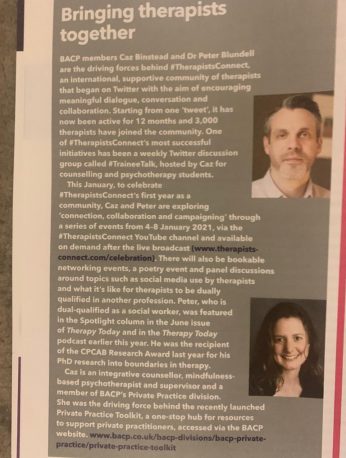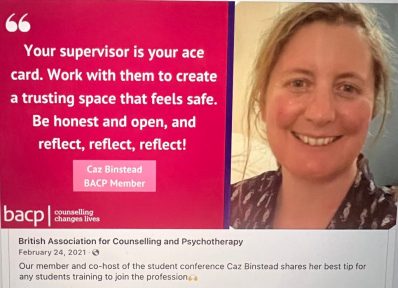Work for 'on the ground' therapists
Throughout my career, I have consistently spoken, and worked for the ‘on the ground’ working therapist. At times, our profession can feel divided, with a chasm between the membership bodies and working therapists. I strongly believe that in order to address inequality and privilege in counselling and psychotherapy professions, we must listen to qualified professionals who have experienced training, and the landscape of the job market, including the world of private practice, in an unregulated profession. Because I am in constant conversation with therapists on the ground in my various guises, I like to speak truth to power. I not only represent the therapists on the ground - I am the therapist on the ground.
Private Practice;
Building ethical and thriving practice
My passion to deliver something akin to the Private Practice Toolkit at BACP, came from my desire for there to be more support for private practitioners. With a less than forthcoming job market, and a changing demographic, more therapists were entering the private sector - according to BACP figures in 2019, some 30,000 of their members. Anecdotal evidence suggested that most training courses did not properly equip students to work in the sector, and, with no dedicated hub of resources from any of the membership bodies (at that time), private practitioners were left on their own to figures out, what is in reality, a niche sector. It felt imperative for me - for both the rights of therapists (who may not have planned to enter private practice), and clients, who deserve to work with therapists who are properly equipped, that some free basic support ought to be available for private practitioners. I am therefore, proud to have been part of changing this, with the creation of the Private practice Toolkit. From my initial vision upon joining the PP divisional exec; to drawing up a proposal presentation in 2019; to becoming the divisional lead on the funded project (2019 - 2022) and helping to design and develop it.
It was an honour for to be invited to present at the BACP AGM 2021, in recognition of this extensive work:
I am currently working on some writing projects in this area (this has included my most recent publication Relational Ethics in Psychotherapy and Counselling Private Practice: Solidarity, Compassion, Justice, Caz Binstead and Nicholas Sarantakis, due to be published November 2024 by Routledge and is currently available for pre-order on Amazon and other bookshops) but in the future will offer services for therapists in:
- My workshop ‘New to Private Practice'
- Copywriting services
- Private consultancy
If you're from an organisation, membership body, or training institute, I am available for Keynote Speeches, Consultation Work, Teaching and Lecturing, Workshops and Advisory Services. Please email me to make contact.
TherapistsConnect Platform
#TherapistsConnect is a community of therapists, set up with the aim of bringing people together in an inclusive way. We advocate for respect and acceptance of diversity, and recognise and celebrate difference in people. Run by myself, Caz Binstead, and Peter Blundell (co-leads) and supported by a team of volunteers, we connect through a multiple of different ways on our social media platforms (twitter: @Therapists_C; Insta: therapistsconnect) - chatting, sharing resources, projects, musings and mutual support.
We also focus on providing a respectful space for professional debate, and seek to create and hold a safe space for the therapist community. In addition, we run community ‘networking’/support spaces, our bookclub, a podcast, and, have a plethora of ongoing broadcasts (available to watch on our YouTube Channel). This includes recordings from our week-long first birthday in January 2021.

Check out our debates, discussions, and interviews, featuring a variety of people, ranging from high profile therapists to ‘on the ground’ working professionals - our community represents all, and we hope to showcase this through our various mediums. We are UK based, but are a Worldwide Community of Therapists, striving to learn the differences in therapy across the world, but also celebrating our similarities and working on behalf of our clients and future clients to raise the profile of the therapy and its importance.
For me, #TherapistsConnect displays my greatest efforts to represent and respect all people in our diverse profession. Bringing together surface level connection - so needed, at the time of the pandemic when everybody lost their usual in-person community support networks; and deeper level connection, where we endeavour to really see those around us, even though they may be different to us.
Work with the student therapy community

What was to become #TherapistsConnect first project - #Traineetalk - an innovative platform for all students of any level, studying counselling/psychotherapy, was conceived in my mind my in early 2020. As the the founder, I approached Peter Blundell - who had, in January sent out the first #TherapistsConnect tweet - with my idea (February 2020).
Since then, it has been immensely popular, with over 500 students taking part from across the globe. Its aim is to bring students of counselling and psychotherapy together for a weekly facilitated Twitter discussion group; supporting the development of students, whilst also providing a unique, safe space, to meet and connect together. Running every Monday 2pm-3pm on Twitter, we hold hourly discussions with a set theme and starter questions, for students to engage with. These facilitated sessions focus on a wide range of different learnings, subjects and issues relevant to the study of counselling and psychotherapy.
In addition, we’ve held a live #traineetalk, and a recorded discussion with our students for one of our #TherapistsConnect conferences, and in July 2021, took part in the academic APT Conference : Reflecting for the future; higher education in disruptive times, delivering an oral presentation: Therapists on Twitter: A case study of facilitating #TraineeTalk, an innovative international social media learning community for student counsellors and psychotherapists (Caz Binstead and Peter Blundell).
One of my greatest passions is helping students who are thinking about going into private practice.
Relational Activism
Relational Activism is best described, as endeavouring to bring about social change through the power of relationships. Becca Dove and Tim Fisher, in their paper, The personal is the political: Relational activism and social justice, cite activist, writer and counsellor Vikki Reynolds, as an example of the relational in action. She talks of being: “amazingly alive in our work when we are able to be fully and relationally engaged, stay connected with hope, with a spirit of social justice” . Hope and connection, are two words that are extremely close to my heart. The belief that we can make changes, not just through what may be described as, the stereotypical traditional activism (which sometimes highlights the divisiveness, a kind of ’them and us’ approach), but, through the building of relationships and forming of connections, feels paramount. Relational Activism is at the heart of the debating and campaigning work that we do at #TherapistsConnect . I also describe in this video, how I view my work with the BACP, from a relational activist perspective:
Being an opponent of the SCoPEd framework, which first released in 2019, just a few months after I joined a divisional executive, brought many other challenges for me, which I write about in this open letter to the BACP chair: https://www.pcsr.org.uk/resources/12 .
One of the other causes that I feel passionately about is that mental health provision should be much more readily available for the general public - accessible, free and fast on the NHS. One of my beliefs is that significantly more money needs to be put into mental health services, and crucially, that existing trained professional ought to be utilised. The counselling and psychotherapy profession, currently unregulated, feels like it is invisible, and a whole workforce is being ignored. This is awful for both people who desperately need our help, and for us professionals, who are limited in job options (hence why so many now need to go into private practice). I've been part of the ‘campaign for universal access to counselling and psychotherapy’ (uACT), and for the Therapy and Social Change Summit, Mind the Vote, I delivered a keynote entitled From Relational Therapy to Relational Activism: The Search for Humanness in a Disconnected World. I am also an active member of the Psychotherapy and Counselling Union (PCU), and through persistent and effective communication on behalf of the union, was a pivotal player in getting the Professional Standards Suthroty (PSA) to conduct a review into SCoPEd.
I’ll keep working for equality, and the championing of rights for all, as best as I can through a relational activist perspective. As the late Desmond Tutu, who did so much good work for the anti-apartheid movement, and later, for LGBTQ+ rights said, “don’t raise your voice, improve your argument”.